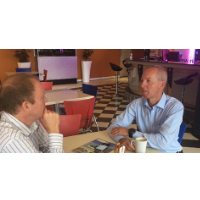The travel management industry has changed beyond recognition in the past 10-15 years, with technology at the forefront of that change. But further change is coming, according to Wings Travel Management’s Chief Operations Officer for Africa & Middle East, Frank Palapies, with both the traditional TMC business and commercial models under pressure to evolve. This he explained to Dylan Rogers over coffee at the company’s Johannesburg office.
Wings Travel has come a long way since its relatively humble beginnings in Johannesburg back in 1992, with the TMC now a global provider of travel and support services, with headquarters in London and 16 wholly-owned and managed operations in North America, South America, UK/ Europe, Africa, Middle East and Asia. As a result, those at the forefront of the Wings operation have a good appreciation of how much the industry has changed, both in South Africa and globally. Wings COO: Africa & Middle East, Frank Palapies, provides another layer to that perspective, as someone who left South Africa in 2007 and returned in 2014.
When he arrived back in the country, what he saw didn’t impress him much. “To my surprise, the industry hadn’t changed, whereas in all other regions the industry was so dynamic,” he says. “Mainly on the leadership side of things, but also in innovation. Now, at least in the past four years, I’ve seen lots of change. I’ve found that South Africa isn’t particularly innovative, when it comes to travel and tourism. Innovation is taking place somewhere else and it will eventually come here, but this is not a melting pot for new ideas.”
Palapies believes the opportunity exists for TMCs in South Africa to drive change and innovation, and change the way the industry operates. “We move people from A to B, and that is the core function of a TMC, but I want to know where the innovation is,” he says. “Innovation comes from assessing needs correctly and then turning that into a solution. The solution itself doesn’t need to come out of South Africa.”
A lot of the solutions in the TMC space today are focused on cutting the costs of demanding clients who have cut their travel budgets and need to find a few extra shekels here and there. Wings Travel are not immune from these pressures. “We need to think out of the box,” says Palapies. “It’s not just that we sell something and focus only on the best fare and what our fee is. If we take this a little broader and take total cost of ownership into consideration, using the data available, scrutinising it and then coming up with innovative ideas, such as different routing etc, there’s definitely potential.” In this regard, Palapies believes the traditional TMC model is ripe for change, and he’s predicting a big shift in 2018. “I see the TMCs taking on more of a ‘broker’ role,” he says. “Our business model is going to change from being a transaction generator who adds no value, to being a broker who works on saving potential for our customers. Our commercial model also needs to change – no longer charging on transactions, but rather on value. So, if we bring your costs down by 20%, I want a share of that. I have to save you costs, but I can, because I have access to all the technology and distribution channels.”
As a major player in the oil and gas space, 2017 was significant for Wings Travel, as it established an operation in Mozambique to support clients moving into this market, following the discovery of some 85 trillion cubic feet of gas reserves in 2011. This appears to have given Wings a few more options, having traditionally focused on the likes of Angola and Nigeria – both of which have found themselves under pressure since the global oil price plunged in 2014. “West Africa will certainly take longer to recover, but I do see light at the end of the tunnel, with investment returning, albeit much slower and not on the scale that you see in other regions,” says Palapies. “We see big potential in Mozambique.” Most importantly, though, Palapies, wants to see the TMC industry challenge itself and change for the better. “I believe it’s our job to simplify complexity and create opportunity. That’s what drives me.”

